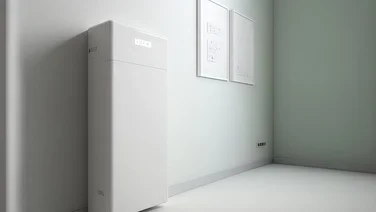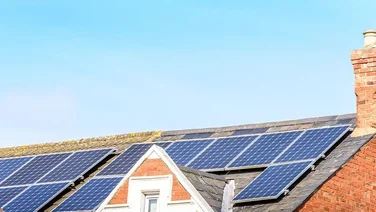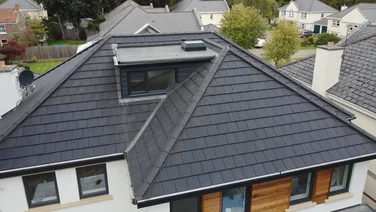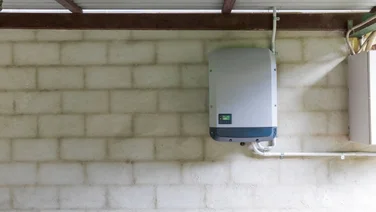We receive a small fee from trusted installers when you request a quote through our site. This helps us keep our content independent, well-researched and up to date – Learn more
- Why should I use solar panels to run a heat pump?
- How many solar panels will I need to run a heat pump?
- What if I don't have much roof space?
- Should I get a solar storage battery?
- Will a battery let me run my heat pump on solar power after dark?
- Is my home suitable for a heat pump and solar panels?
- How much will a heat pump and solar panels cost?
- Summary
- A 3.5kW solar PV system run an air source heat pump entirely on solar energy
- A solar battery can make your clean electricity go even further – and let you run your heat pump for free after dark
- Solar panels cut the typical home’s electricity costs by £1,788 per year

Heat pumps and solar energy are a match made in green heaven. Running your heat pump with solar panels doesn’t just do wonders for your carbon footprint, it could also slash your bills to zero.
This is because heat pumps run on electricity – and grid electricity is currently more expensive than gas. Special tariffs keep heat pump running costs down, but if you really want to make a heat pump cheap (or free) to run, power it with solar panels.
The right size solar PV system will power your home all day, including your heat pump. If you add a solar storage battery, the system could provide all the power you need, 24/7.
In this article we’ll explore how many solar panels you’ll need to power a heat pump, and what else you can do to run a heat pump for next to nothing.
What type of central heating do you currently use?
Get startedWhy should I use solar panels to run a heat pump?
First, there are the huge environmental savings you’ll make by switching to sustainable power and heating. Next, you stand to save a lot of money.
Heat pumps run entirely on electricity. Running your heat pump on your own solar energy could potentially slash your electricity bill to nothing.
Sustainability and reduced bills aren’t the only benefits, though. Studies have found that heat pump systems may warm up faster when run using solar panels.
“In a sense, you end up with your own homegrown power station, and for once in my life I’m actually in charge of the energy that’s coming in and going out and deciding where I want it to go,” said Alan, an Octopus Energy customer:
How many solar panels will I need to run a heat pump?
The typical 3.5kW solar PV system (ten 350W solar panels) produces almost enough solar electricity to run a heat pump.
According to our solar panel output calculator, a 3.5kW system produces around 2,650 kilowatt hours (kWh) of electricity per year, or 220KWh per month. That almost covers the 246kWh of electricity used monthly by the average domestic air source heat pump.
However, the average 2-3 bedroom UK household uses 200kWh per month for all non-heat pump electrical uses such as the kettle, fridge and washing machine.
Add that to the 220kWh typical non-heat pump usage, and you’re looking at around 470kWh per month. To cover that completely, you would need enough solar panels to create a 5-7kW solar PV system.
In terms of bills, 470kWh of electricity costs £149 per month (£1,788 per year) if you’re paying the Ofgem price cap, or around 20% less on a special heat pump tariff. You could cut these running costs to zero with a big enough solar PV system.
What if I don’t have much roof space?
The best way to get a large solar PV system without having a massive roof is to choose individually powerful panels.
Today’s best solar panels pack a much bigger punch than 350W. You would only need 10 of the Seraphim SRP-670-BMC-BG 670W panel, for instance, to create a 6.7kW solar PV system. This would be enough to power all the electricity needs of a 2/3-bedroom household with a heat pump. Panels as powerful as this would increase your upfront costs, though.

You could also consider a solar thermal system. These rooftop systems use sunlight to heat your water. A typical solar thermal system costs £4,000, which is a hefty upfront cost, but it cuts the water-heating load on your heat pump and significantly reduces the electricity your pump needs to run.
Should I get a solar storage battery?
Adding a solar storage battery to your PV system is an excellent way to ensure you have enough solar electricity to run a heat pump and all your other appliances.
You may be able to run everything, heat pump included, with a battery as small as 5kW. But a larger 10kW battery such as the Puredrive PureStorage II can store all the electricity you would need to run your home and heat pump for a day. This battery costs around £2,400-£5,500.
You don’t need a 10kW solar PV system to fill a 10kW battery. A 5kW solar system is enough to fill a 10kW battery.
Check out our guide to the best solar batteries for the largest, best value and most innovative batteries currently available.
Will a battery let me run my heat pump on solar power after dark?
Yes. Even the biggest solar PV system can’t produce electricity at night, only during daylight. Without a battery, you’d need to use National Grid electricity to run your heat pump after dark. With a battery, you may not need grid electricity at all.
Your battery will store any excess energy your solar panels produce during the day, so you can use your solar electricity 24/7. For example, to run a heat pump on chilly winter evenings.
We think a battery is a vital part of a solar-and-heat-pump set-up. It lets you get the best out of both your solar panels and your heat pump, and means your home is powered and heated completely sustainably.
Is my home suitable for a heat pump and solar panels?
Most houses in the UK are suitable for heat pumps and solar panels. The most obvious requirement is adequate roof space for solar panels, and some outdoor space for a heat pump.
You’ll also need some indoor space for a water tank, heat pump indoor unit, solar inverter and, if you decide to get one, a storage battery.
You won’t need planning permission unless you live in a listed building or conservation area. If you’re not the homeowner, you will need permission from the landlord. You should also get permission if you’re in a leasehold property.
A heat pump system may require some home upgrades such as improved insulation and larger radiators, but this isn’t always the case. The best heat pump installers and solar panel installers will be able to advise on whether your home is suitable, and guide you on any necessary upgrades and costs.
How much will a heat pump and solar panels cost?
You stand to pay from around £4,000 to £10,000 to have solar panels installed, according to our article on how much solar panels cost. According to industry data, a 3.5kW system for a three-bedroom house costs around £7,000.
Solar panels save you around £500 per year on electricity bills, so the system pays for itself in about 14 years.
Heat pumps are more expensive than solar panels, but government grants for them are much more generous than for solar panels. Your installer will automatically subtract the £7,500 Boiler Upgrade Scheme grant from the price of your heat pump, leaving you with an average of around £4,000 to pay.
How big is your solar panel system, and how roughly much did it cost?
“We had a combined package of solar panels and solar batteries, with a capacity of 13.8kW. The total cost was £14,500. The panels were about £5,000.“We have a detached house, and the panels virtually cover the rear roof.”
Are you able to power your heat pump with the electricity your solar panels generate?
“In the summer, when we used the heat pump for hot water, the solar panels powered our heat pump.“I expect it won’t be enough in winter, but at that time we’ll use overnight low-cost electricity to charge our batteries to power the heat pump.”
How much money do your solar panels save you on your electricity bills?
“We are saving with solar, but the heat pump and batteries are accounting for some of the savings.
“We used to pay about £100 a month to fuel the car, and £240 for gas and electricity. Our electricity bill for July 2023 was £60.
“As we haven’t had a full winter with the heat pump, we can’t say yet what the winter costs are. But overall, we are no longer worried about fuel bills.”
Kassy lives in North Yorkshire, and has owned solar panels and solar batteries since February 2023.
Summary
- Having solar panels installed slashes the cost of running a heat pump
- A 3.5kW solar PV system can produce most of the electricity needed to run a heat pump
- To cover your home’s other electricity needs as well, you’ll need a more powerful solar PV system of around 7kW
- A solar storage battery can help your solar energy go much further – including powering your heat pump after dark








